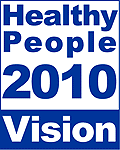- In This Issue:
-
- New County-Level Diabetes Data Available on CDC’s Diabetes Data & Trends Website
- Endocrinologists Support Comprehensive Treatment Regimen for People with Pre-Diabetes
- Applications Available for the 2009 Healthy Vision Community Awards Program
- NDEP Encourages School Personnel to “Get Your Students to Move It: Schools Can Help Lower the Risk for Type 2 Diabetes in Youth” in August
- Mark Your Calendars: Upcoming NDEP Promotions
- Tips for Working with NDEP: How to Become an NDEP Partner
- On the Road with NDEP
New County-Level Diabetes Data Available on CDC’s Diabetes Data & Trends Website
CDC’s Diabetes Data & Trends website, which provides resources documenting the U.S. public health burden of diabetes and its complications, now includes the prevalence of diagnosed diabetes by county. These county-level data are estimated using data from CDC’s Behavioral Risk Factor Surveillance System (BRFSS) and the U.S. Census Bureau’s Population Estimates Program, and they provide a clearer picture of areas within states that have higher diabetes rates. Nationally, the data indicate increased diabetes rates in areas of the Southeast and Appalachia that have traditionally been recognized as being at higher risk for many chronic diseases, including heart disease and stroke.
Excel and HTML files with county estimates for the entire nation and for each state are available for downloading. National data is available as a link located below the national maps, and the state data is available as a link below each state map. For more information, visit www.cdc.gov/diabetes and click on the “Data and Trends” link at the left or read CDC’s recent press release.

Endocrinologists Support Comprehensive Treatment Regimen for People with Pre-Diabetes
The American College of Endocrinology and the American Association of Clinical Endocrinologists recently released a consensus statement recommending a comprehensive treatment regimen for patients with pre-diabetes. A task force explored the spectrum between normal glucose tolerance, pre-diabetes and diabetes, and the risks across the continuum. The recommendations call for specific guidelines on both lifestyle and pharmaceutical intervention where appropriate. The statement reinforces NDEP lifestyle prevention messages, tailored to audiences from adolescents to older adults and women with a history of gestational diabetes. Tip sheets are available in English, Spanish, and 15 Asian and Pacific Islander languages. View these NDEP resources for its Small Steps. Big Rewards. Prevent Type 2 Diabetes campaign at www.YourDiabetesInfo.org.

Applications Available for the 2009 Healthy Vision Community Awards Program
NIH’s National Eye Institute is pleased to announce that applications for the 2009 Healthy Vision Community Awards (HVCA) program are now available. This program provides funding up to $10,000 for the implementation of eye health education and promotion activities that support the Healthy Vision 2010 objectives and the Healthy People 2010 goals to reduce health disparities and improve quality of life. The focus of each program must be eye health education. The 2009 HVCA funds are not intended for research projects or to provide direct medical care.
Nonprofit organizations are encouraged to apply, including community-based organizations and agencies, minority-based organizations, schools, faith-based organizations, civic and fraternal groups, community clinics, local Agencies on Aging, and state and local health departments and agencies. Universities and university affiliations, such as medical centers and schools of optometry and ophthalmology, are precluded from receiving an award directly, but are welcome to collaborate with eligible groups, such as community-based organizations. The final selection of award recipients will be based on a combination of the evaluation score, geographic and racial/ethnic representation, and project innovation. All applications must be postmarked by Friday, August 29, 2008. Awards will be announced in January 2009.
Application forms and program information are available at www.healthyvision2010.org/news/hvca. If you have questions about the application package or eligibility requirements, please email your questions or requests to HVCAmail@shs.net.
To find program ideas or to search for programs that have been funded in your state, visit the Healthy Vision Community Programs Database.

NDEP Encourages School Personnel to “Get Your Students to Move It: Schools Can Help Lower the Risk for Type 2 Diabetes in Youth” in August
Increasingly, school personnel and parents are concerned with helping overweight youth lower their risk for type 2 diabetes. Young people can achieve and maintain a healthy weight by making healthy food choices and increasing their physical activity during the school day. NDEP’s Move It! And Reduce Your Risk for Diabetes School Kit can assist schools in developing programs to help students lower their risk for the disease. This free resource was originally developed for American Indian and Alaska Native students, but it can be adapted for students of all races and ethnicities.
This month, NDEP is promoting a new feature article entitled, “Get Your Students to Move It: Schools Can Help Lower the Risk for Type 2 Diabetes in Youth”* to highlight the Move It! kit. The article includes information about the kit’s contents, positive feedback from school personnel and students who have adapted the kit, and ideas for how school personnel and students can incorporate the kit into school activities. For more information about lowering the risk for diabetes in children and adolescents, check out NDEP’s Tips for Teens: Lower Your Risk for Type 2 Diabetes tip sheet.
NDEP is also currently promoting Helping the Student with Diabetes Succeed: A Guide for School Personnel* to educate and inform all school personnel about diabetes, how it is managed, and how each school staff member can help meet the needs of students with diabetes. The School Guide reflects a consensus from a broad spectrum of federal agencies and leading organizations in the diabetes and education communities on how schools can better meet the medical needs of students with diabetes and provides a framework for managing diabetes effectively in the school setting. For more tools to promote the School Guide, visit the NDEP website.


Mark Your Calendars: Upcoming NDEP Promotions
In September, NDEP will promote a new feature article, “Small Steps, Big Rewards for Families with a History of Gestational Diabetes”* to general print and online publications. The article emphasizes that both women with a history of gestational diabetes and their children have a lifetime risk of developing diabetes. Additionally, tips are provided to help women and their families stay healthy and reduce their risk for developing type 2 diabetes. For more information, read NDEP’s It’s Never Too Early to Prevent Diabetes. A Lifetime of Small Steps for a Healthy Family. tip sheet.
In October, NDEP will release a new feature article highlighting 10 healthy snacks to help teens stay at a healthy weight and lower their risk for type 2 diabetes. For additional healthy eating tips for teens, check out NDEP’s resources on children and adolescents.
In each issue of News & Notes look for NDEP promotional tools that are ready for you to personalize, customize, and distribute.
- Take our feature articles, press releases, and public service announcements, and add your organization’s logo*.
- Add your organization’s name and mission and talk about how you and NDEP are working together.
- Add your contact information to a feature article.
- Then submit the ad and/or article to your local paper.
By using our promotional tools, everybody wins. Your community newspaper receives a story with important health information for its readers, your organization receives good publicity, and you help NDEP continue to be the nation’s No. 1 resource for free information and materials on diabetes control and prevention. Each issue of News & Notes features tools that tie into the following month’s promotions and can help us promote NDEP together.

Tips for Working with NDEP: How to Become an NDEP Partner
Much of NDEP’s success is due to our extensive network of over 200 partners at the federal, state, and local levels. By taking an active role in this important initiative, you can make a difference in your community and help NDEP spread the good news that diabetes can be managed, and type 2 diabetes can be prevented or delayed. NDEP encourages you to take advantage of all the support, resources, tools, and expertise that it offers to help you educate your organization or community. Here are a few ways you can become an NDEP partner:
- Tap into NDEP’s resources to help your organization develop ideas for diabetes education activities;
- If you or your organization is active at the local or state level, join your state Diabetes Prevention and Control Program’s efforts to expand the reach of NDEP messages and activities;
- Incorporate NDEP messages and strategies into your organization’s diabetes education activities, materials, and supporting initiatives;
- Enhance the reach of NDEP messages and materials to address target audiences by reproducing and distributing NDEP messages and materials via media and other distribution channels;
- Share information, as appropriate, regarding effective diabetes materials and activities with NDEP and its other partners;
- Participate in NDEP’s biannual Partnership Network Meeting (next scheduled for August 2009);
- Provide a link on your website to NDEP’s websites: www.YourDiabetesInfo.org, www.DiabetesAtWork.org, and www.BetterDiabetesCare.nih.gov; and
- Provide NDEP with samples of materials produced and/or distributed that reflect your partnership with NDEP.
For more information, download NDEP’s partner guidelines*.

On the Road with NDEP
NDEP will exhibit at these upcoming conferences:
- American Association of Diabetes Educators
August 6-9, 2008; Washington, DC
Kevin Peterson, M.D. will present an NDEP session here on Saturday, August 9, at 2 p.m.
- American Academy of Family Physicians
Sept 17-21, 2008; San Diego, CA
- American Dietetic Association
Oct 25-28, 2008; Chicago, IL
NDEP-NIH Director Joanne Gallivan, M.S., R.D. will receive the American Dietetic Association’s Excellence in Community Dietetics Award here during a session entitled, “The Diabetes Pandemic: The Role of the Dietitian” on October 27 at 3 p.m.

